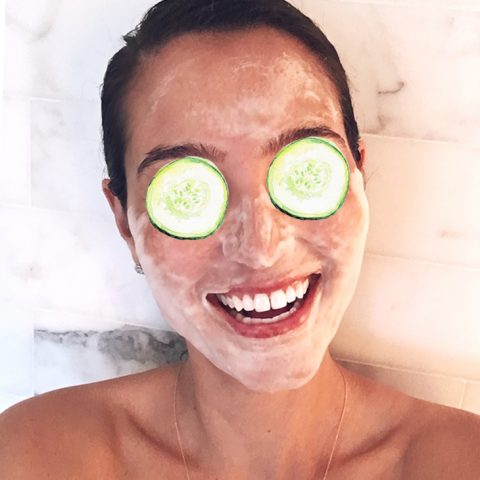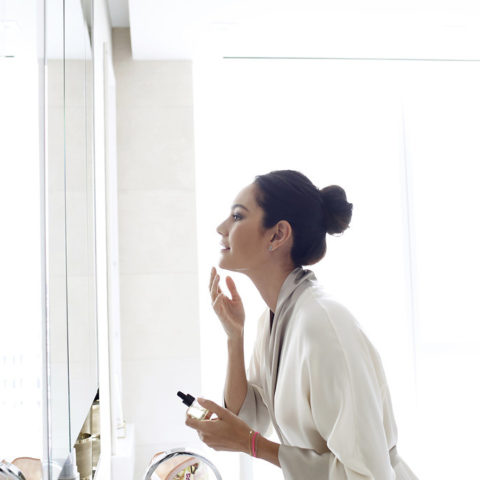













The use of perfume is as old as humanity. It’s no news that ancient Egyptians used scents to celebrate different milestones of their lives. Many centuries later, perfumes traveled across borders with Frenchmen who took their colognes during voyages to the Americas.
In recent times, perfume has been used as a symbol of luxury for a remarkable user experience. And that’s why fragrances have found their way to our personal care products.
Perfumes in Skincare
Perfumes, popularly referred to as parfum or fragrance, are volatile compounds used to produce pleasant scents- their origin can be traced to plants, animals, and synthetic sources.
When it comes to picking out our care essentials, fragrance plays a considerable role in our choices. The reason is not far-fetched – your sense of smell, which is the most advanced of all your senses, influences your emotions when making purchases.
You may observe that your mood feels elated after using an orange-scented body scrub, or you may fall in love with how fragrant your sweet-smelling vanilla bath gel leaves your bathroom – all thanks to your olfactory powers.
Also, fragrances are used to mask the undesirable scents of products that are formulated with chemicals with pungent odors.
In the beauty world, perfume is like an “innocent” bystander often overlooked for its viciousness because it makes us feel good. Other than the power of scents, perfumes have no added benefits.
As enticing and alluring as perfumes in products are, they may be health disruptor.
Dangers of perfumes
According to a study carried out by the American Academy of Dermatology (AAD),
approximately 5.7 million people visit the doctor’s office every year for a common reason – perfume allergy.
Perfume poisoning is a common occurrence, and that’s why perfume has been touted as the chief cause of allergic contact dermatitis.
Below are some skincare concerns that perfumes can cause;
Approximately 5.7 million people visit the doctor's office every year for a common reason - perfume allergy.
Does my product have synthetic fragrances?
The skincare world is flooded with a sea of products, and you can hardly tell what’s genuine, as most products, even those that have “fragrance-free” emblazoned on them, are still laced with fragrances.
What’s worse? Product manufacturers are protected by the laws of the FDA, which permits them to hoard their trade secrets by listing a plethora of ingredients as “parfum/fragrance.” However, if you want to know if your beauty essential is formulated with perfume, look out for following ingredients in your product listing;
Eugenol
Geraniol
Linalool
Limonene
Citronellol
Cinnamal
Is there a way out of this?
Fortunately, these days you’ll notice that many people are making a switch to the “alternative side,” as they have become awakened to the impact beauty products could have on their health. Fragrance selection and use are not left out of this transition. And that’s why the use of essential oils in skincare has shot to widespread popularity.
Enter Aromatics.
Let’s take a deep dive into the world of natural and safer scent options.
What are Aromatics?
Aromatics is an umbrella term used to describe essential oils. Essential oils are fragrant oil extracts from plants that are used to enhance holistic health. Essential oils are extracted from plants via distillation or cold processing. Oils extracted via chemical processing are not essential oils.
Why we love Aromatics.
With essential oils, there’s more than just “the power of scents.” Aromatics offer a wide range of benefits that perfumes oils lack.
A few of these benefits are;
Essential oils play crucial roles in skincare, and that’s why they have become a staple in our range of skincare products. The beauty gains of using essential oils are numerous, from managing pigmentation to reversing premature aging and even reducing skin irritations.
How can I select the right essential oil for myself?
There’s an essential oil for every skin type; oily, dry, combination, sensitive, and normal. However, it is advisable to use tiny quantities and dilute essential oils with carrier oils due to their concentrations. The wrong usage of aromatics can leave you with burns, rashes, photosensitive, or dryness.
To stay in a sweet spot, we advise that you opt for products from brands that operate on transparency by listing all their ingredients.
At CocoBaba, all our products are created from scratch using cold-pressed oils by expert formulators – no oil infusions, no greenwashing. Our skincare lineup is safe and suitable all skin types.
beautybeauty routineNatural beauty